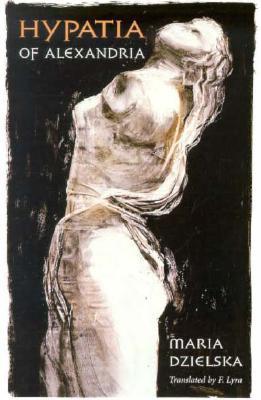
by fljustice | Mar 12, 2011 | Biographies, Books, Hypatia, Reviews, Wonderful Women
Hypatia of Alexandria: Two Books
It’s March—Women’s History Month and the anniversary of a remarkable woman’s death. In AD 415, a Christian mob murdered Hypatia, the renowned Lady Philosopher of Alexandria. The vicious act shocked the city and shamed the early Church. Socrates Scholasticus tells the story in his Historia Ecclesiastica:
“Hypatia, daughter of the philosopher Theon, who made such attainments in literature and science, as to far surpass all the philosophers of her own time…For all men on account of her extraordinary dignity and virtue admired her the more. Yet even she fell a victim to the political jealousy which at that time prevailed. For as she had frequent interviews with Orestes, it was calumniously reported among the Christian populace, that it was she who prevented Orestes from being reconciled to the bishop. Some of them therefore, hurried away by a fierce and bigoted zeal, whose ringleader was a reader named Peter, waylaid her returning home, and dragging her from her carriage, they took her to the church called Caesareum, where they completely stripped her, and then murdered her with tiles. After tearing her body in pieces, they took her mangled limbs to a place called Cinaron, and there burnt them. This affair brought not the least opprobrium, not only upon Cyril, but also upon the whole Alexandrian church. And surely nothing can be farther from the spirit of Christianity than the allowance of massacres, fights, and transactions of that sort. This happened in the month of March during Lent, in the fourth year of Cyril’s episcopate, under the tenth consulate of Honorius, and the sixth of Theodosius.”
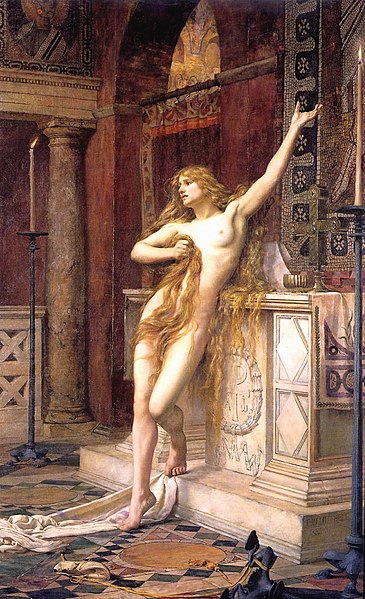
Hypatia, painted by Charles William Mitchell in 1885.
Since that time, only fragments about Hypatia’s life have come down to us; allowing poets, novelists, playwrights, scientists, feminists and religionists (both pro and anti) to appropriate her story for themselves. Her story has resonated down through the years, touching many people. She’s a major character in my novel Selene of Alexandria, the subject of the recent movie Agora directed by Alejandro Amenabar, and she rated a plate in Judy Chicago’s massive art piece The Dinner Party. She’s the subject of plays, poetry, propaganda and new age pagan polemics. Her life is represented in art and music. But what do we really know about her? Not much.
In researching my novel, I waded through a literary swamp, with no guide, trying to get at some coherent view of Hypatia and her story. She was young/middle aged/older when she died. She was single/married/promiscuous/virginal. She was a pagan/witch/Christian. She was a brilliant mathematician/scientist to some and, according to others, contributed nothing worthwhile in either discipline. I read the few primary sources, but didn’t have the academic background to evaluate their usefulness. Socrates was a contemporary, but a church historian. Damascius was a pagan who wrote a full generation later. John of Nikiu wrote 200 years later. Who had an agenda and what was it?
Two scholars have attempted to pull the pieces together in book form in the last two decades: Maria Dzielska, a Polish classics scholar, with Hypatia of Alexandria; and mathematics professor Michael A. B. Deakin with Hypatia of Alexandria: Mathematician and Martyr. I’ve read both, several times, in my research and want to share my thoughts. (more…)
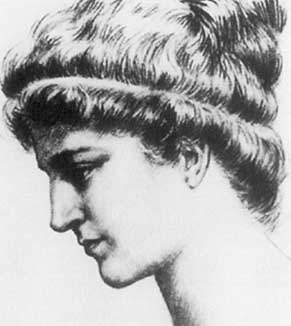
by Faith Justice | Jun 8, 2010 | Agora, Essays/Research, History, Hypatia, Movies, Reviews, Wonderful Women
Agora: the “Reel” vs. the “Real” Hypatia – Part III
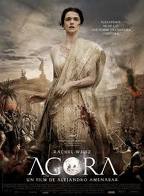 In Parts I & II of this series on the history behind the movie, I talked about several major historical events of the times and a couple of my favorite anecdotes that made it into the film. In Part III, I’ll look at the major characters, how they were portrayed in the film and what we know about their real lives. Because I’ve written so extensively about Hypatia (essays, guest blogs, a novel, and a non-fiction book) I’ll save her for last. (more…)
In Parts I & II of this series on the history behind the movie, I talked about several major historical events of the times and a couple of my favorite anecdotes that made it into the film. In Part III, I’ll look at the major characters, how they were portrayed in the film and what we know about their real lives. Because I’ve written so extensively about Hypatia (essays, guest blogs, a novel, and a non-fiction book) I’ll save her for last. (more…)

by Faith Justice | Jun 3, 2010 | Agora, Essays/Research, History, Hypatia, Movies, Reviews, Wonderful Women
Agora: the “Reel” vs. the “Real” Hypatia – Part II
 In Part I of this series, I talked about some of the controversy surrounding this film and dealt with a few of the historical events depicted: the fire-walking Christian, Hypatia’s science and students, and (one of my favorite stories) the bloody handkerchief. In Part II, I continue with the events depicted in the movie including the destruction of the Temple of Serapis and the Great Library, the expulsion of the Jews from Alexandria, and Hypatia’s murder. In Part III, I’ll deal with the characters. Again, for those who haven’t seen the movie – spoilers! (more…)
In Part I of this series, I talked about some of the controversy surrounding this film and dealt with a few of the historical events depicted: the fire-walking Christian, Hypatia’s science and students, and (one of my favorite stories) the bloody handkerchief. In Part II, I continue with the events depicted in the movie including the destruction of the Temple of Serapis and the Great Library, the expulsion of the Jews from Alexandria, and Hypatia’s murder. In Part III, I’ll deal with the characters. Again, for those who haven’t seen the movie – spoilers! (more…)

by Faith Justice | Jun 1, 2010 | Agora, Essays/Research, History, Hypatia, Movies, Reviews, Wonderful Women
Agora: the “Reel” vs. the “Real” Hypatia – Part I
 Finally! The movie Agora starring Rachel Weisz as Hypatia, the Lady Philosopher of Alexandria made it to the US shores. I’ve been following the controversy around this film for several months. Alejandro Amenábar wrote (with Mateo Gil) and directed this English language film with an international cast. Because it shows early Christians as intolerant and murderous, it kicked up some dust in Catholic European countries. There was even some talk about whether it would make it across the pond. In New York City, it is only in two “art house” theaters, hardly a major release, but it did garner a “critics’ choice” designation by the New York Times.
Finally! The movie Agora starring Rachel Weisz as Hypatia, the Lady Philosopher of Alexandria made it to the US shores. I’ve been following the controversy around this film for several months. Alejandro Amenábar wrote (with Mateo Gil) and directed this English language film with an international cast. Because it shows early Christians as intolerant and murderous, it kicked up some dust in Catholic European countries. There was even some talk about whether it would make it across the pond. In New York City, it is only in two “art house” theaters, hardly a major release, but it did garner a “critics’ choice” designation by the New York Times.
But, why was I excited? Because the movie is about my people and my events; characters and times I’ve studied and lived with for over twenty years; characters and events featured in my book Selene of Alexandria. Normally, I’ll go to a historical movie with some relish, but this time it was with eager anticipation and some trepidation. Would the writers/director get it right—the setting, the politics, my beloved characters? And here’s the answer: big picture yes, details no. For the record, this is not a movie review. I’ll leave the assessment of Agora’s worth as a piece of art to others. For those who haven’t seen the movie, there are spoilers. But if you know the story of Hypatia, you basically know the movie plot. What I talk about is the history behind the movie-what the writers/director got right and what (in my opinion) they got wrong. (more…)
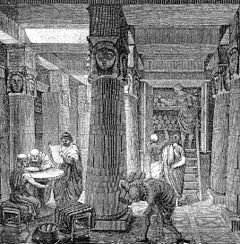
by fljustice | May 8, 2010 | Essays/Research, History, Hypatia
Burning Books: What Really Happened to the Great Library of Alexandria

19C illustration of the Great Library
The Great Library of Alexandria conjures images of bearded scholars strolling marble halls, studying rolls of papyri at large wooden tables, or arguing with colleagues under covered walkways. The loss of “the world’s knowledge” through wanton destruction is a metaphor for the coming of the Dark Ages in Europe. But what was the Great Library really and how was it destroyed? (more…)




